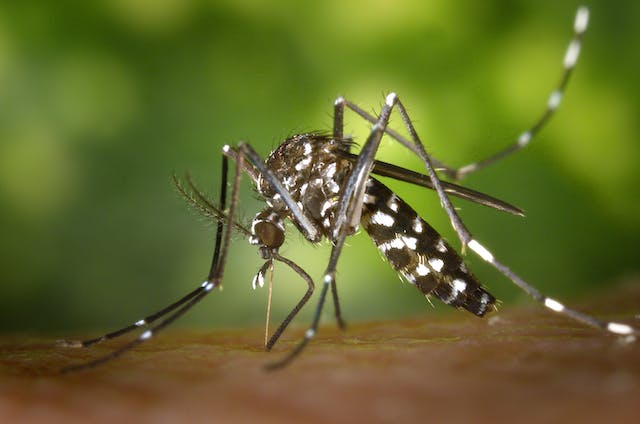Mosquitoes in India can carry dengue, malaria, Japanese encephalitis, chikungunya, filaria, and zika virus. They all are different viruses, affect different areas, and result in varying levels of illness.
Ultimately, you don’t want these diseases, and neither do you want your kids to get them. They can be debilitating, painful, and in some cases, deadly. Around 725,000 people die in India every year from mosquito related diseases.
The takeaways:
- Odomos with N, N-diethyl-benzamide is effective and safe to be applied on skin for children and adults
- The best practice is physical barriers such as clothing, mosquito nets and screens
- Nothing can be used on young babies to deter mosquitoes other than physical barriers
- Use of mosquito vaporisers may be safe, depending on the ingredients. Turn on in an empty room, and let the scent dispel before putting the child in the room
- Use of most repellants is harmful to children’s airways, and can cause harm
How Do Mosquitoes Pass Diseases On?
Male mosquitoes don’t bite and are useful only for mating. They simply hang around water bodies waiting for a female to show up. It’s the female mosquitoes that need blood meals in order to procreate. That means they are out and about, looking for delicious people and animals to snack on.
Mosquitos are a ‘vector’ of disease, meaning the illness itself doesn’t affect them, and they aren’t the source, they just carry it. They feed on a human or animal who has the disease. The virus survives inside them, and then they pass it on.
When mosquitoes bite a human to have a blood meal, they inject saliva into the skin as it helps them to extract blood faster. This saliva is what causes the bump and itching. And if you’re unfortunate enough, the mosquito was carrying a disease, and has now infected you via this saliva.
What is Skeeter Syndrome?
Very young children and babies typically have a huge reaction to the first few mosquito bites. They don’t have any immunity yet, and so their bodies have a massive overreaction. It’s normal for the bump to be huge. This goes away quickly, and they build up tolerance over time. You can apply cold compresses and a local antihistamine cream (hydrocortisone 1 %).
However, you should seek help if they also have a fever, if the skin blisters, if the reaction gets worse and becomes more red and swollen, or they start struggling to breathe.
Best Practices for Avoiding Mosquito Bites
Before anything else, know that no form of repellent is to be used on children younger than 2-3 months. Be vigilant, use physical barriers, but nothing else. Their respiratory tracts are vulnerable to fumes and use of repellents can result in difficulties breathing.
Also, note that there are different kinds of mosquitoes, and they react to different chemicals in different ways. They also breed differently, so while eliminating stagnant water works to get rid of some, others only require a decent rainfall, and they hatch in damp soil or sand.
Ultimately, you don’t want your kid getting bitten by mosquitoes (or yourself either). The first line of defence, and the best, is physical barriers. Have mosquito screens on your doors and windows, and shut them at ‘mosquito o’clock’. Mosquitoes avoid direct sunlight as it can dehydrate them so they like to be out from sundown to sunrise.
Have mosquito nets over beds. Mosquito nets are a fire hazard, so don’t light candles or coils near them. Nets can also minimise air flow under them and do represent a strangulation hazard for toddlers and infants. Use them only as directed by the manufacturer.
When you’re outside, wear long sleeves and pants, and in loose styles.
Chemical Deterrents for Mosquitoes
Mosquito Coils
Mosquito coils are not safe for use around babies. They are a fire hazard, and can cause respiratory issues for children. A study found that inhaling the smoke from a mosquito coil is the same as inhaling smoke from 137 cigarettes.
Essential Oils to Repel Mosquitoes
Essential oils are not that effective for repelling mosquitoes. Oils typically have to be applied to the skin and highly concentrated in order to work. They also are not safe for use around babies and young children as they can cause issues breathing and also skin irritation.
Oil of lemon eucalyptus in particular must not be used on the skin of children below three years of age. Oils may have some ability to repel mosquitoes, but individual products are not tested. You don’t know what you’re really applying, or how strong it is.
Mosquito Patches
Mosquito patches work on the theory that the smell deters mosquitoes. There are also fabric roll ons. The ones that use ‘natural’ deterrents do not work to deter mosquitoes reliably, or at most, they only provide protection for a short period of time. The DEET based ones are effective but not safe due to the heavy fumes.
Ultrasonic Devices to Repel Mosquitoes
These claim to emit ultrasonic sounds waves that repel mosquitoes. They do not work.
Mosquito Vapourisers
These are the ‘Good Night’ type of vaporisers which are designed to be plugged in. The wick is heated and it evaporates the liquid inside which goes into the air. There are typically two types: ones that use insecticides like allethrin, parallelthrin and permethrin. They work by repelling insects and killing the ones already inside.
The ‘natural’ ones contain a mix of ingredients that claim to deter mosquitoes.
These vaporisers could be safe for use around children, but there’s no real testing that’s been carried out. Best use is to turn them on in an unoccupied room and close all doors and windows. Leave it on for a while, and then turn it off for some time to allow the scent to dispel before the child uses the room. Or, use it near doors and windows or other entry points of mosquitoes.
Aerosol Insecticide Sprays
These use chemicals, same as the ones in vapourisers. However, due to the way they work, it’s deemed unsafe for use around babies, especially those that contain kerosene.
Skin Repellent Creams and Oils
Some of these are effective, some are not. Again, some are safe for use on children, some are not. It depends on the ingredients.
In India, we recommend the local product Odomos which contains the ingredient ‘N, N-diethyl-benzamide’. It is as effective as Deet, without the bad smell or worries about toxicity.
What’s the Deal with DEET in India?
DEET is the gold standard, world-wide, for mosquito repellents. While it might have some issues (for example, if it’s mixed with sunscreen), there are no significant health risks in using it. So, why isn’t DEET available in India?
It is available, but only on imported products which attract lots of import duties, making it too expensive for most people. It’s expensive to make locally, so it’s just not viable. Also, since there’s a local product (N, N-diethyl-benzamide in Odomos) that’s just as effective, there’s no need for it.
Blood Types and Mosquitoes
Are you one of those lucky people who mosquitoes just aren’t interested in? There are a few reasons why. Mosquitoes seem to like body odour, warmth, and dark clothing. But aside from that, they also show a preference for people with type O blood type.
Does Mosquito Fogging or Fumigation Help?
In many areas, you’ll see fumigators out at mosquito o’clock, blasting a range of fumes that allegedly kill any mosquitoes in the vicinity.
But it’s not effective.
It only kills the adult mosquitoes there at that time, not the larvae. It requires repeated applications (every 3-4 days) to get a result and kill the emerging adult mosquitoes. Things like heat and wind can minimise the effectiveness of the chemicals too.
It seems like the mosquitoes know it’s happening, so they rush up to the trees to escape the fog, have a good laugh and a chai while they relax, then fly back to bother us once the fog dissipates.
The best thing to fog with is a synthetic pyrethroid, because it’s effective, cheap, and harmless to humans and animals (except fish). But in India, usually it’s a mix of 95% diesel and 5% something else, often malathion. This means you’re inhaling diesel fumes combined with insecticides, a recipe for respiratory issues.
In Hyderabad, mosquitoes have been found to be resistant to chemicals used in fumigation, so they decided to use DDT (Dichlorodiphenyltrichloroethane). This is a chemical which is banned in a lot of countries (including a partial ban in India in 1972) because it possibly causes cancer in humans, and can result in vomiting, tremors, and shakiness.
‘Even the experts at municipal corporations of Delhi feel that fogging is more about assuring people that some action is being taken… Fogging only creates a false sense of security among people and diverts attention from preventive action for dengue by the state and community. It is only a way of appeasing people at the cost of their health. The government needs a systematic sanitation drive and emphasis on clean surroundings so that mosquitoes do not get breeding grounds. The community has a very important role to play in controlling dengue by keeping private premises clean.’
Are Mosquito Repellent Ingredients Safe, or Not Safe?
| Name of chemical | Safe or not safe for children? | Effective on mosquitoes? | Notes |
| Allethrin | Toxic on skin, safe when inhaled | Aerosol kills about 50% of mosquitoes | |
| Camphor | Not safe | Mixed effectiveness | |
| Cedar essential oil | Yes. Limited use to diffuse over two years, however it’s ineffective | No | |
| Citronella / lemongrass essential oil | No. Skin and respiratory irritant | Mixed effectiveness | |
| Clove essential oil 2-undecanone | Yes, limited use to diffuse over two years | Yes | |
| DEET, N-diethyl-m-toulamide, N, N-diethyl-3-methylbenzamide | Yes | Highly effective against mosquitoes | Do not swallow |
| Deltamethrin | No. Potentially neurotoxic | Yes but don’t use it | A pyrethroid |
| Dichloromethane (DCM), or methylene chloride | No | Can cause miscarriage | |
| Dimethylphthalate (DMP) | No | Yes but don’t use it | |
| IR3535 | Yes | Yes | |
| Kerosene | No | Yes. Sprayed on water, it breaks surface tension and suffocates larvae | Spraying/ fogging/ fumigation is of limited value |
| N, N-diethyl-benzamide | Appears to be safe for use with children | Highly effective against mosquitoes (as much as DEET) | This is found in Advanced Odomos Cream |
| Naphthalene | No, extremely toxic to children, causes cancer | ||
| Neem oil, active ingredient azadirachtin | Not as an oil applied anywhere or inhaled. Can cause toxic encephalopathy and Reye’s–like syndrome | Yes- Plant it around your home | |
| Oil of lemon eucalyptus (OLE) | No | Yes | |
| Permethrins/ pyrethrin[6] | Appears to be safe for use with children | Yes | These include a range of chemicals all based on natural pest repellants found in daisies and chrysanthemum |
| Picaridin known as KBR 3023 and icaridin outside the US | Yes | Yes | |
| PMD (p-Menthane-3,8-diol) – synthetic version of lemon eucalyptus oil | No | ||
| Prallethrin | Safe on skin, ‘moderately’ toxic when inhaled | Appears to be | |
| Rosemary essential oil | No | No | |
| Thyme essential oil | Not as an oil applied anywhere or inhaled | Yes | |
| Tulsi ‘holy basil’[7] | Yes | Yes – plant it everywhere | Further study needed into how it should be applied |
| Vanilla Essence | Yes | Yes but it has to be vanilla essence, not vanilla-flavoured essence | Highly expensive |
| Vitamin B1 | Not unless prescribed by a doctor | No |

